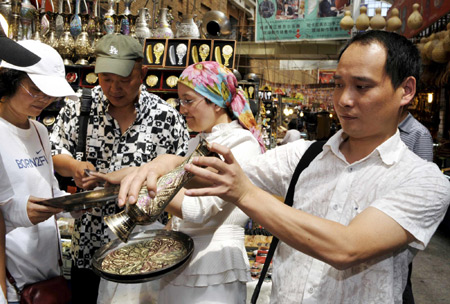URUMQI: The streets in Urumqi, capital of northwest China's Xinjiang Uygur Autonomous Region, were busy on Wednesday. Chinese and foreign tourists flooded the markets, bargaining with local sellers in different languages and accents.
|

Customers select commodities at the International Grand Bazaar in Urumqi, capital of Xinjiang Uygur Autonomous Region, July 22, 2009. [Xinhua]
|
But posters of wanted suspects on walls kept alive in people's minds the deadly riot one month previously, in which 197 people died.
The presence of armed police guarding major intersections with shields and guns shows hidden tension in which the northwestern city is healing its wounds with difficulty.
ENDLESS WAITING
After more than 20 days, Wang Liping from Kashgar finally found her 15-year-old son in Urumqi.
"I was so anxious during those days," the exhausted mother said. "I had DNA tests done at the police bureau, followed the rising death toll in the newspapers and posted many notices."
What she didn't know was that her son, afraid of being attacked outside, had hidden in internet cafes most of the time.
The boy was found by a restaurant owner, who happened to see a notice left on a pole by the desperate mother.
Wang said she was lucky, as there were still people searching for their beloved ones, those they might never see again.
Wang Yonggang lost contact with his wife on July 5. The 34-year-old from Yining city, more than 700 kilometers away, said that his wife came to Urumqi several days before the riot looking for a house to open a shop.
"A friend told me he saw my wife in Yining. But if that was true, why didn't she call me?" he kept asking.

